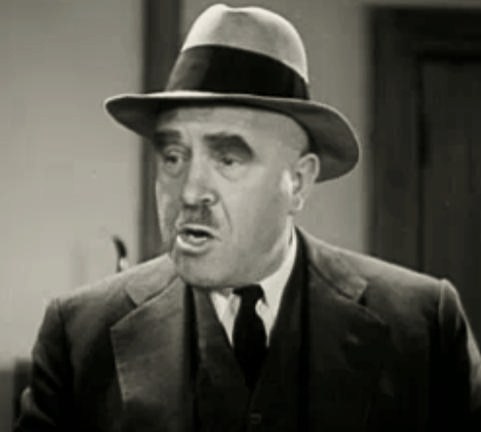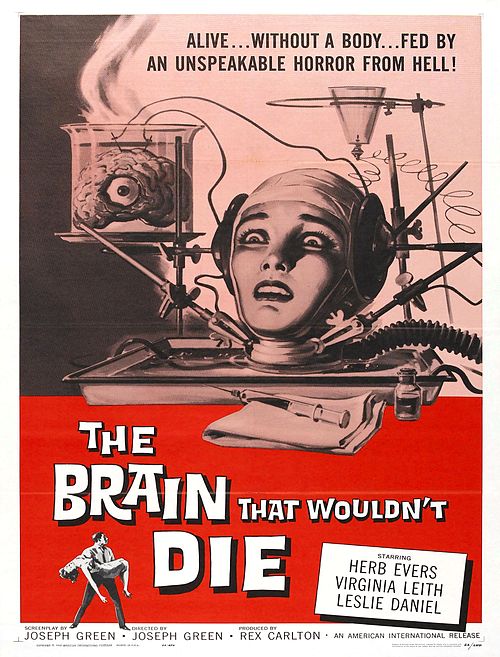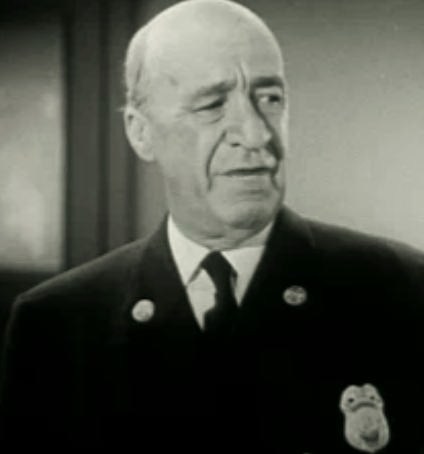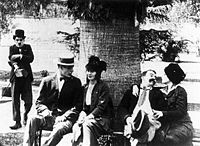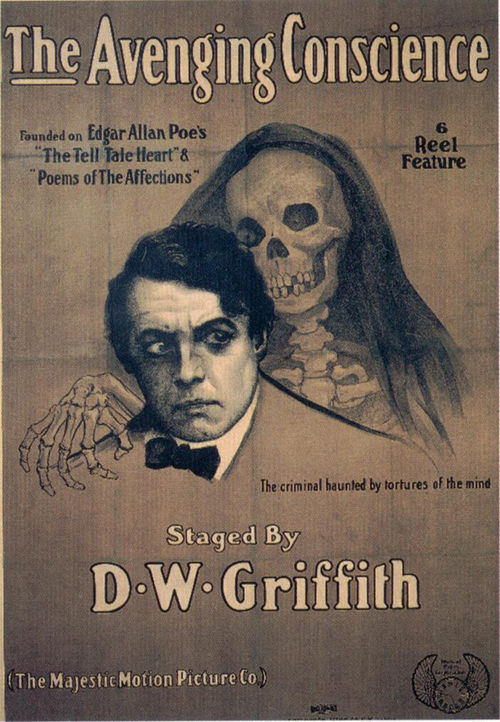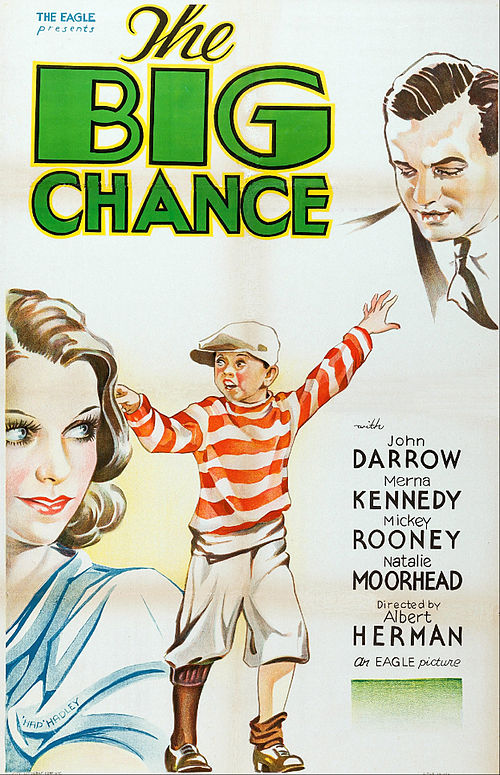Advertisement
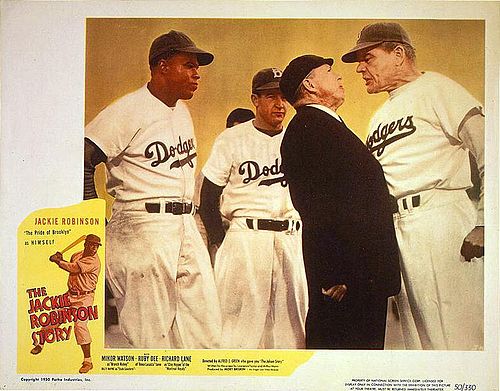
Image source: Wikimedia Foundation (wikimedia.org)
Download Movie [Video Format: MP4]
Movie Source: Internet Archive (archive.org)
Advertisement
Advertisement
Jackie Robinson Story, The
1950
This biography of Jackie Robinson is not a great film. More than anything it represents a significant milestone in baseball and the civil right movement. Jackie doesn't do a terrible acting job which you don't really notice because the screen play, although light, is very face paced. The viewer is rocketed through the life of a young pre-teen Jackie Robinson, his football college career, touches on his military service in the second world war, his minor league career, and through his 1949 season with the Brooklyn Dodgers.
The Jackie Robinson Story is a 1950 biographical film directed by Alfred E. Green (who had directed The Jolson Story, "one of the biggest hits of the 40s")<></> and starring Jackie Robinson as himself. The film focuses on Robinson's struggle with the abuse of racist bigots as he becomes the first African-American Major League Baseball player of the modern era.
The film is among the list of films in the public domain in the United States. However a new copyrighted "restored and in color" version was released in conjunction with the Jackie Robinson Foundation in 2008.
Plot
The film begins with Robinson as a boy. He is given a worn-out baseball glove by a stranger impressed by his fielding skills. As a young man, he becomes a multi-sport star at the University of California, Los Angeles, but as he nears graduation, he worries about his future. His older brother Mack Robinson (athlete) was also an outstanding college athlete and graduate, but the only job he could get was that of a lowly Street sweeper.When America enters World War II, Robinson is drafted, serving as an athletic director. Afterward, he plays baseball with a professional African-American team. However, the constant travel keeps him away from his college sweetheart, Rachel Robinson.
Then one day, Brooklyn Dodgers scout Clyde Sukeforth invites him to meet Branch Rickey, president of the Major League Baseball team. At first, Robinson considers the offer to be a practical joke, as African Americans are not allowed to play in the segregated major leagues. When he is convinced that the opportunity is genuine, he and Rickey size each other up. After thinking over Rickey's warning about the hatred and abuse he would have to endure without being able to strike back, Robinson signs with the Dodgers' International League farm team, the Montreal Royals. Though he wants to delay marrying Rae to shield her, she insists on an immediate wedding so she can support her man in the trying times ahead.
Robinson leads the league in hitting in his first year, and despite the grave concerns expressed by the Commissioner of Major League Baseball, Rickey goes ahead and promotes him to the Dodgers. Reviled at first by many of the fans and some of his own teammates, Robinson gets off to a shaky start, playing out of position at first base and going through a hitting slump, but then gradually wins people over with his talent and determination. The team goes on to win the pennant, with Robinson driving in the tying run and scoring the winning one in the deciding game.
At the end, Robinson is invited to address the United States House of Representatives in Washington, D.C.
Cast
- Jackie Robinson as Himself
- Ruby Dee as Rachel Robinson
- Minor Watson as Branch Rickey
- Louise Beavers as Jackie's mother
- Dick Lane (TV announcer) as Clay Hopper
- Harry Shannon (actor) as Frank Shaughnessy
- Ben Lessy as Shorty
- William H. Spaulding as Himself
- Billy Wayne as Clyde Sukeforth
- Joel Fluellen as Mack Robinson (athlete)
- Bernie Hamilton as Ernie
- Kenny Washington (American football) as Tigers Manager
- Pat Flaherty (actor) as Karpen
- Larry McGrath as Umpire
- Emmett Smith as Catcher
- Howard Louis MacNeely as Jackie as a boy
- George Dockstader as Bill
Production
Principal photography for the film took place in the off-season following his 1949 Brooklyn Dodgers season.</>According to Bosley Crowther, "What is surprising...in this new film ...is the sincerity of the dramatization and the integrity of Mr. Robinson playing himself. Too often, in films of this nature about sports figures, fanciful or real, the sentiments are inflated and the heroics glorified. Here the simple story of Mr. Robinson's trail-blazing career is re-enacted with manifest fidelity and conspicuous dramatic restraint. And Mr. Robinson, doing that rare thing of playing himself in the picture's leading role, displays a calm assurance and composure that might be envied by many a Hollywood star."< name="nyt"/>
Colorized version
On April 19, 2005, 20th Century Fox and Legend Films released a film colorization version of the film, donating a portion of the proceeds to the Jackie Robinson Foundation, a charity that benefits education for gifted students. An "official" version remains in release by MGM Home Entertainment (whose sister company, United Artists, produced this film).
See also
< name="nyt"></>
}}
Category:1950 films
Category:1950s drama films
Category:1950s sports films
Category:American baseball films
Category:American biographical films
Category:Biographical films about sportspeople
Category:Black-and-white films
Category:Brooklyn Dodgers
Category:Eagle-Lion Films films
Category:English-language films
Category:Films about racism
Category:Films directed by Alfred E. Green
Category:Films set in the 1940s
Category:Jackie Robinson
Category:Sports films based on actual events
Mort Briskin


